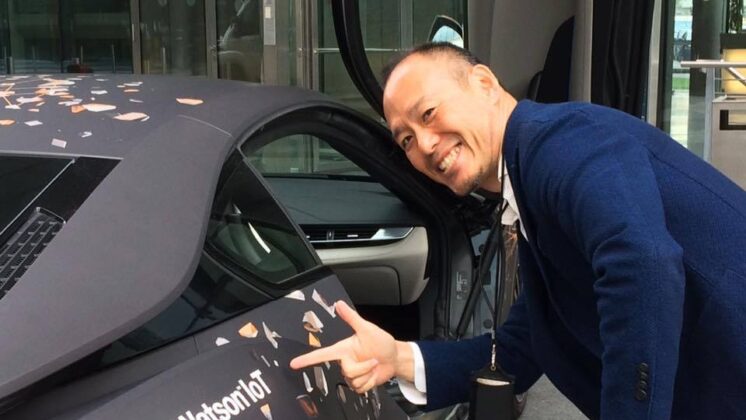GLOBIS faculty Cristian Vlad met with Talent & Engagement Partner Hideki Ishida of IBM Japan to discuss how innovation occurs at his company.
CV: I’ve had the pleasure of working with you for about three years. You have always inspired me, but where do you get your inspiration?
HI: Everywhere! Everywhere I go, every single client I meet inspires me to think differently and try to come up with a new solution, a new way of doing things that will redefine reality and benefit everyone involved.
I was always impressed by my grandfather, Tatsuhiko Ichihashi, who wrote a book loosely translated as, Guys Who Know How to Put on a Festival Also Know How to Grow a Business (in Japanese,「祭り」をつくれる男が企業を伸ばす). The book was published in 1984, but it still is so relevant and real. Good businesses are fun, dynamic, engaging, and inspiring. They are run by people full of life, people with vision and commitment, people with an unwavering love for life, customers, employees, stakeholders and society. Such people are the most valuable asset of any smart business and they know how to create meaningful opportunities when everyone else sees only roadblocks and impediments.
CV: So, to your mind, business is like a show or a big event?
HI: Fun businesses are really big events, and smart businesspeople are also event planners. As Shakespeare put it, “All the world’s a stage…” Knowing what and whom to have on the stage at the right time and being able to skillfully coordinate awe and excitement leads to the production of a great show. Businesses which do not awe, which do not inspire their customers and employees, end up being pure transactions. These transactions might be good to have, but no one really believes in them. Innovation does not really happen there.
CV: So where does innovation happen?
HI: Innovation happens where people are genuinely happy and proud. Happy with the environment and with the structure and the organizations they belong to; proud with the brands they work for, represent, and create. This simple truth seems to have gone into oblivion in our rush for mass production and mass consumption. This is a great time, I believe, for a lot of businesses to look deep inside, to rediscover and maybe redefine their identity and, while doing so, make every effort to bring fun back to life.
CV: That is so true—being seen as having fun, truly enjoying your job, seems to have recently become a bit of a taboo. As if you are not working hard enough, or are not fully dedicated.

HI: That’s exactly what people who are not really serious or fully dedicated to work themselves may think. Being results driven doesn’t mean that you have to frown, yell, create tons of PowerPoint presentations, or cry in front of a computer. Smart business people spend as much time as possible where their business takes place, where their clients are, and where problems are waiting to be solved. That is where true value creation is.
Smart business people in 2018 are focused on always creating new realities, always transforming the current state of affairs. They are striving to recreate, to innovate, and to develop new, higher standards. They are mobile, agile, and they work everywhere. They do not need a certain number of office walls, ceilings, or floors to define their creativity. They create value everywhere they go, and they are appreciated for their commitment to innovation.
CV: It obviously takes a lot of courage to do that.
HI: Of course it does. Most of all, it takes the courage to be different. In our rush for growth and obsession with standardization, just-in-time production and conformity, many of us have forgotten to simply be human. Children have been raised to obey, to conform, to study exactly the same textbooks as everyone else in order to pass standard exams and join big-name organizations. Many adults too have grown to think that being different is dangerous. But, is it really? What is the real danger?
I see diversity as a core competency for innovation, for growth and meaningful transformation. Groupism is outdated. It is reminiscent of the just-in-time mass manufacturing days. Humanity today has evolved.
Businesses need innovation, and people need inspiration. We need to learn how to best tap into our diverse pool of talent to bring about meaningful innovation and growth.

CV: How can we do that?
HI: Collaboration, collaboration, and collaboration once again. For example, our collaboration with BMW to produce the world’s first IoT-empowered car. In every smart business, collaboration is the sweet spot in employee engagement and customer centricity. Modern organizations raise talent who know how to create ecosystems of collaboration and co-creation, both internally and externally. Knowing how and having the courage to reach out to those who can help create new and meaningful realities is already mandatory for the modern business person. Sitting inside an office and waiting to be told what to do simply does not work any longer.
CV: Are there any practices you would recommend for modern business creation?
HI: There are many, as you know well. Design thinking, for example. The art of constant innovation through timely and interactive customer engagement. It may even be the hinge on which a product thrives or dies. Constantly reaching out to customers and engaging them in product and service development is what many companies are doing today. Our customers love to be involved in the process of creation, and they are readier than ever to offer candid contributions.
We cannot talk about customer engagement without having the customer at the very center of everything we do. Offering our customers an opportunity to co-create, to be part of the development of a certain product or service, is all it takes to turn them into ardent ambassadors of that product or service. This redefines everything we do—it redefines customer engagement, it redefines marketing, it redefines sales.
CV: And how can we encourage talent to start thinking and acting that way?
HI: Many organizations are already working on bringing fun back to business, while clearing away tedium. In order to create the ultimate employee experience, they employ advanced ontological design, creating spaces conducive to creativity and innovation. Many businesses are already investing in developing sustainable innovation cultures, environments where everyone feels safe, welcome, and included. Psychological safety is an absolute must in our rapidly changing workplace. Smart organizations develop and communicate their employee value propositions, just as much as they communicate their customer value propositions.

CV: One last question. How do you stay up to date with so many things on your plate?
HI: I read—a lot. I read everything I can lay my hands on. I am especially inspired by The Monocle magazine and their podcast programs. I am also constantly inspired by technology. Things which we used to dream of are rapidly becoming part of our reality: virtual reality, augmented reality, IoT, AI, big data, to name just a few. Businesses all over the world already carry out their international meetings in virtual reality – no more tedious phone calls, Webex meetings, or other rigid communications. The business world is becoming so dynamic; professional teams are adopting agile practices.
At IBM, we are working closely with our clients to bring fun back. In our talent and engagement practice, we encourage our clients to embrace modern technology and to develop professionals capable of mastering new technologies to dynamically create value for customers, employees, and society.




